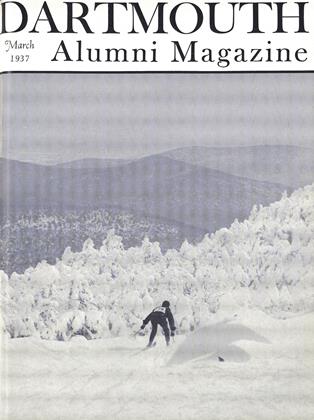Since no student of hockey contests the basic fundamentals which Coach Gill puts forward as his coaching aim, and since no follower of the Dartmouth hockey teams over a period of four years has any opinion other than that Coach Gill's hockey system has been sound, it would seem that the Indian stickmen of this season have been in the wrong if they have attempted to be critical of Coach Gill's hockey system. Likewise I would say any Dartmouth team has acted disgracefully that has broken the unwritten law of Dartmouth athletes, 'hat to represent the college on the sports field in any condition other than perfect physical shape resulting from complete regard for training rules is an unpardonable action. (We draw no conclusions as to whether the players have been critical of Gill's coaching of hockey or whether training rules have been broken by one, or any, of the players.)
We believe the present situation that led to the resignation of Coach Gill hinges around the complaint of the players that Gill has been a driving type of mentor. First, there has been no truth whatever in a metropolitan newspaper account that Gill once locked a player in his room as a disciplinary measure. This and another account that Gill once suspended one of his team members for eating an ice cream cone are preposterous fabrications.
It is nevertheless true that Gill has always been noted for his constant use of antagonism for getting the most out of his players. In his first year at Dartmouth the material was older and more experienced and apparently thrived under the method, for the Indians walked away with the Quadrangular League championship. However, each succeeding squad has shown decided tendencies toward resentment of these "driving" coaching tactics until this year the squad reached a definite stage of open discontent.
It may be concluded that Dartmouth each year has had younger and less experienced hockey material and hence less able to understand the goal toward which Coach Gill was aiming. Certainly one can conclude that the days when the Big Green's famous Coach Cavanaugh rabble- roused his tough, experience-hardened football gridsters with success is a thing of the past. Baseball's unforgettable John McGraw was another who employed these tactics with great results, but it took men to stand the pace. Thus I think it should be said in all fairness, that if the members of the hockey squad have misunderstood Coach Gill's handling of them, it can be laid to the fact that the present undergraduate in this, or any other college, does not understand the "old-school" of coaching, perhaps to the happiness of all concerned.
In any event, the discussion of the difficulties under which both parties concerned were trying to mold a winning Indian sextet had an immediate effect on the team's competitive spirit and the Big Green six played inspired hockey in losing to Queens, 2-1, and defeating Yale, 4-1, on February 11 and 13.
Previously Harvard's strong sextet had administered a 14-4 drubbing, one of the worst setbacks a Big Green hockey team had taken in several years. True, Toronto defeated Dartmouth by a wide margin earlier in this season and Harvard a year ago walloped Dartmouth by even a larger margin in the play-offs of the 1935-36 Dartmouth-Harvard series. But neither of these games was played under the ideal conditions of a Carnival crowd, good ice, and big stakes.
 View Full Issue
View Full Issue
More From This Issue
-
 Article
ArticleYANKEE INGENUITY HAS NOT ENTIRELY DISAPPEARED, A TALE OF "AUSTIN'S ANTS" AND THEIR ANTICS
March 1937 By JOHN HURD JR. '21 -
 Class Notes
Class NotesClass of 1930
March 1937 By Albert I. Dickerson -
 Class Notes
Class NotesClass of 1926
March 1937 By Charles S. Bishop -
 Class Notes
Class NotesClass of 1936
March 1937 By Richard F. Treadway -
 Class Notes
Class NotesClass of 1911
March 1937 By Nathaniel G. Burleigh -
 Article
ArticleHanover Browsing
March 1937 By HERBERT F. WEST '22
ROBERT P. FULLER '37
-
 Sports
SportsFollowing the Big Green Teams
December 1936 By ROBERT P. FULLER '37 -
 Sports
SportsWINTER TEAMS CARRY ON
January 1937 By ROBERT P. FULLER '37 -
 Sports
SportsSTRONG AT DEFENSE POSTS
January 1937 By ROBERT P. FULLER '37 -
 Sports
SportsFollowing the Big Green Teams
April 1937 By ROBERT P. FULLER '37 -
 Sports
SportsFollowing the Big Green Teams
June 1937 By ROBERT P. FULLER '37 -
 Sports
SportsSPRING FOOTBALL
June 1937 By ROBERT P. FULLER '37







